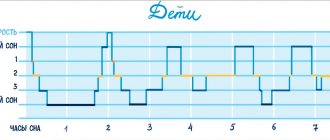Parents often notice that the child moans in his sleep. This condition causes mothers not only anxiety, but also a number of questions about what this problem is related to. Most often, children begin to moan due to psychological factors. However, in some cases, such sounds signal the development of a number of pathologies. In view of this, it is not recommended to ignore the problem.
Causes of moaning in children
Why does a child moan in his sleep? There may be several reasons for this condition:
- The baby is teething. As a rule, the appearance of the first milk teeth is always accompanied by pain. Moreover, the child may scream due to severe pain at night;
- The baby moans due to the accumulation of gases in the tummy. A similar problem is more often observed after the baby has eaten heavily;
- If the baby was born premature, he will also frighten you with nighttime moans. In this condition, parents need to wait until the baby’s condition stabilizes, after which the frightening sounds will disappear forever;
- The kids begin to moan when their sleep cycle changes. This is due to the fact that in infants the body adapts to a new environment. Moreover, the process is accompanied not only by groans, but also by sobbing, as well as trembling of the body.
Important: Even newborn babies dream. A smile on the face of a sleeping man indicates that he is having a pleasant dream. But if the baby is tormented by nightmares, his behavior becomes alarming. In addition, moans, sobs and even crying become audible.
The main reason why a baby sobs and groans in his sleep is mostly due to physiological factors. And as a rule, when a child’s body goes through the process of adaptation, problems in the form of night moaning disappear without a trace.
It is worth highlighting separately that sometimes children can moan and grunt in their sleep if they experience positive emotions. This happens due to the fact that during rest the brain intensively digests all the information received by the child during the day. And if the memory reveals moments of communication with parents, funny games and other pleasant moments, a smile appears on the sleeper’s face, and he himself groans.
And lastly, newborns maintain a strong emotional connection with their mother for a long time. All this affects the child’s condition. For example, if the mother is not nearby, the baby begins to moan or cry. You can solve this problem by rocking the baby to sleep nearby, and then transferring him to the crib.
Baby sleep stages and phases
To fully understand the topic that interests us, you need to know the characteristics of children's sleep under the age of one year. It makes no sense to refer to your own experience of falling asleep and waking up, since the structure of a baby’s sleep is significantly different from ours. Sleep has two main phases - deep and superficial. It is during the deep phase that the human body makes a complete reboot, the nervous system gets rid of stress, and the muscles of the body rest. This stage in an adult takes up about eighty percent of the total night's rest, and the superficial phase accounts for about twenty percent of the time.
In an infant, the situation is diametrically opposite: eighty percent falls on the superficial phase of night rest, and only twenty percent falls on the deep phase. It is with such situations that the fact is connected that it is quite difficult to wake up an adult at night, and the baby wakes up several times during the night, informing his parents about this with his crying. A baby can sleep up to 18–20 hours a day, this is also due to the short duration of the deep stage of sleep.
The results of medical research have confirmed that dreams come to a person during the superficial phase. Based on this fact, it can be assumed with a high degree of probability that infants have a lot of dreams, because their stage of superficial sleep is long. What do newborns dream about?
Why do babies moan?
Why does a child under one year old moan? As mentioned above, this problem arises due to adaptation. During pregnancy, the baby is in the womb in almost ideal conditions. However, with birth, conditions change.
If previously nutrients were supplied through the umbilical cord, now the baby needs to work hard to get food for itself. In addition, wet diapers and not always suitable air temperature add discomfort.
In addition, a baby may whine and moan for a number of reasons:
- with excessively tight swaddling. In such a situation, the baby does not have the opportunity to move his limbs normally, as a result of which dissatisfaction with groaning appears;
- uncomfortable sleeping place. If the bed causes discomfort, the child begins to moan or cry;
- wet diapers. As mentioned above, wet things can provoke moaning;
- excessive overwork, due to which sleep becomes superficial. Because of this, the baby can not only moan, but also cry;
- hungry children also react to this problem by moaning in their sleep;
- if the air in the room is very hot, children experience a lack of oxygen, which provokes groans;
- extraneous sounds. Loud conversations in the room can disturb the baby's rest and thereby cause groaning, and then waking up;
- another provocateur of the disease problem or pain in question. These include teething or colds;
- nightmares. Many parents believe that babies cannot dream. Actually this is not true. From birth, babies dream and they are not always pleasant.
Important: During sleep, newborns actively develop all important systems and organs. In addition, the so-called psychological pressure is removed and muscle mass relaxes. All this provokes the manifestation of twitching and groaning.
Most of the problems that cause moaning to be heard from the nursery are not dangerous to health. Moreover, they are easily eliminated by removing the provoking factor. Well, to find out the origin of the problem you need to take a closer look at the baby. If he is active during the day, eats well and is cheerful, then there is no reason to sound the alarm.
However, if a child behaves lethargically during the daytime, eats poorly, sleeps less and is capricious, parents should immediately show the baby to a doctor.
Physiological reasons
After birth, the baby's lifestyle changes dramatically. In the womb, he fed through the umbilical cord, did not use his lungs, and so on. In the new conditions, everything is different: the baby eats differently, which means the digestive system works in a new mode. He breathes using the respiratory organs; the ambient temperature is also significantly different from the mother’s body temperature. The child must get used to these and many other changes. The process of adaptation to new living conditions is also a cause of anxiety in young children's sleep. Let us list some more physiological reasons:
Physiological reasons cannot harm the health of children, so if restless sleep is caused by them, then there is no reason for fear and panic. They are eliminated with your love, attention, and patience.
Moans in children from one to three years old
Why do children from one to three years moan? If such a problem has not been observed before, then most likely the provocateur is of psychological origin. Closer to 1.5 years, children's waking time increases significantly. In addition, every day the brain accumulates a large amount of information, which is sometimes difficult to process. As a result, the body becomes very tired.
In addition to the problem described above, night moans can be provoked by a number of other provocateurs:
- prolonged physical activity leading to fatigue;
- receiving a large amount of information often provokes increased blood pressure, rapid heartbeat and severe headaches. All this causes mental stress, as a result of which the child groans and tosses and turns in his sleep;
- By this period, children develop fears. Almost anything that is unknown to him can scare a baby. As a result, in a dream the child may begin to whine and moan;
- another problem that provokes moaning in sleep, uncomfortable conditions for night rest. If a child runs around a lot, he can fall asleep in any position and place. However, after a short period the child will begin to moan;
- From birth, children sense well when their mother is nervous or if the atmosphere in the house is tense. Moreover, by the age of 1.5-2 years, children understand when their parents are quarreling. All this often provokes the appearance of night moans;
- visiting preschool institutions is also often the culprit for the occurrence of frightening sounds at night. The reason is that active communication with other children provokes temporary anxiety. As a rule, if this is the problem, the night moaning will disappear within a couple of weeks.
Children's experiences often result in nightmares. This condition is called in medicine as rest regression in children. This problem is temporary and disappears as soon as the stage of mental adaptation is completed.
Regression occurs 3 times:
- at 1 year old;
- one and a half;
- and at two years old.
There is no need to be afraid of such a state. As a rule, absolutely all children go through them, since it is a natural process. During these periods, the main task of parents is to establish a friendly atmosphere in the house. When all three stages have passed, the child's sleep will normalize, the child will stop moaning and waking up at night.
However, if the parents find that the problem is protracted and the baby is bothered by symptoms such as:
- groans are observed regularly;
- crying occurs in a dream;
- waking up is frequent;
- the baby is afraid to be left alone;
- there is a categorical reluctance to go to bed.
If such signs occur, you should immediately consult a doctor. Perhaps the problem lies in the development of pathological diseases.
Is it dangerous for a newborn to moan during sleep?
It's not uncommon for babies to moan in their sleep. Mothers begin to worry that these are health problems. Before such frightening thoughts, it is better to thoroughly understand why the baby moans in his sleep. You need to start with the signs of restless sleep:
Most of all, young mothers are frightened by incomprehensible sounds, and completely in vain. Most often they do not pose any threat. But you shouldn’t ignore them when the mother’s heart is restless. The new world evokes even in a baby a sea of emotions, which he continues to experience in his sleep and groan because of it. If the child is active and calm while awake, then his moaning in his sleep is not dangerous. But if a breastfeeding baby is lethargic during the day and begins to moan during sleep, then he needs to be shown to a doctor to make sure he is in good health.
Baby's sleep: biology and sounds
The first time after birth, the toddler goes to sleep when he gets tired. It's hard to put him to sleep against his will. And if this happens, then a quiet rest is a rarity. It is also important that feeding should be frequent, approximately every 2 hours, for some a little longer. Therefore, the baby will often wake up, and this is a completely natural phenomenon.
Young parents mistakenly believe that the baby should sleep all night, and this rest should be calm and sound. In fact, the baby spends about 5 hours on this. Afterwards, he begins to groan and demand food. You shouldn’t forcefully wake him up to feed him; let him wake up on his own and want to eat. It is normal for a newborn to make different sounds during sleep, and this is not only a groan, but also grunting, light cries, and smacking.
Important! The sleep norm for an infant is 18 hours a day, which takes into account both night and daytime rest.
Many mothers, being frightened, wake up the comb and this is wrong. Doctors believe that it is quite natural for a newborn to moan and cry in his sleep. So, he experiences the negative emotions that he experienced while awake and removes them from his consciousness. Sometimes this is a test of parents: are they nearby, will they provide help. This scanning function of sobbing and groaning is inherent in nature itself, so you shouldn’t worry about them.
Toddlers up to one year old often wake up and immediately fall asleep. This is also normal. Even when the baby sobs in his sleep and twitches slightly, this is also the norm. And this is due to an unformed nervous system. The older the child becomes, the less manifestations of nervous excitability he has, which means his rest becomes more relaxed.
Stages
A newborn baby's sleep has 2 phases:
Literally on the third day, active sleep transforms into the rapid stage. It is this stage that makes up 45% of the child’s total sleep. Thanks to it, the little person’s brain grows and develops; it also acts as a protective barrier to negativity and helps relieve stress.
By three months, restful sleep turns into slow sleep, which is possible only with sufficient brain formation. Later, children begin to sleep in deep sleep, which is much deeper for them than for their parents. They need 20-30 minutes to completely restore energy in the body and charge the immune system.
If the cause of moaning is the development of pathology
In some cases, night moans signal to parents about the development of pathological processes in the child’s body. As a rule, in this condition, the sounds made by the child in his sleep will be accompanied by the following manifestations:
- increased body temperature;
- problems with normal breathing and wheezing;
- excessive sweating;
- an increase in the size of lymph nodes;
- cough, suffocating;
- the appearance of rashes on the skin;
- nausea, vomiting and diarrhea;
- abdominal pain accompanied by bloating.
Regular sounds at night should alert parents. Moreover, if they are accompanied by frequent waking up, it is not recommended to ignore the problem. Remember, lack of sleep worsens the child’s general condition. In addition, this condition leads to the development of neuroses and mental disorders.
Important: Moans at night can also signal mental disorders. In fact, such a state will be expressed by aggressiveness towards others. Therefore, visiting a pediatrician should be mandatory.
Often, serious mental disorders are diagnosed in children while still in the maternity hospital. However, there are other dangerous conditions that can only be detected once the child reaches a certain age.
Pathological causes
Sometimes the restless sleep of children under one year of age is accompanied by additional manifestations that should concern parents. Such symptoms most likely indicate the presence of some kind of disease. Here are some of them:
If any of these symptoms occur, the baby feels discomfort and, possibly, pain. This affects the quality of his sleep; the baby may moan, sob, whine, squirm, twitch his limbs, and so on. These symptoms are probably a manifestation of some pathological processes; parents should promptly consult a doctor. The baby’s immunity is just beginning to develop, so the time factor in such circumstances is decisive.
In addition to somatic pathologies, mental disorders can also be the cause of restless sleep. Sometimes mental disorders are diagnosed immediately after birth, and some diseases of this type can only be detected after some time.
How to prevent night symptoms
Unfortunately, a healthy psychological atmosphere in the home and proper care do not always guarantee a restful sleep for a child. And the reason, first of all, is that the child’s psyche is unstable and unpredictable. However, despite these important factors, parents can still create conditions that will minimize negative nighttime symptoms.
The famous children's pediatrician Komarovsky claims that following several rules will help minimize the consequences of discomfort during rest, namely:
- a few hours before bedtime, stop any active games. The baby needs to be given time to calm down before resting;
- stick to the feeding schedule and do not overfeed the baby at night;
- fairy tales with a scary plot line or stories with a negative ending should not be heard from parents;
- bedding for children should be made from natural fabrics. In addition, when purchasing a mattress and pillow, give preference to orthopedic models;
- If your child sleeps in his room, turn on a night light for him. With this simple device you can prevent fear of the dark.
Important: Take an interest in the child’s life, have conversations with him and then any looming problem will be solved. However, remember, it is better to ask about what is causing concern during the daytime. Towards evening, the child’s body needs to reduce the intensity of emotions.
In addition, do not forget about daily walks in the fresh air. And lastly, try to build a trusting relationship with your child. Let him share new impressions, so parents will be able to find out what the child is afraid of and promptly eliminate the problem that has arisen.
Night moans are overwhelmingly not considered a dangerous pathology. However, if such a condition is accompanied by a number of other negative factors, the parents’ task is to visit a doctor as soon as possible.
Probability of danger of development of pathological processes
This behavior is dangerous when children are sick or suffer from pathology. At the initial stage of treatment, this is normal, because the medications have not yet begun to actively work. If therapy has been going on for a long time, and the moaning continues, you need to contact a pediatrician who will change the medications or prescribe an additional examination. Otherwise, there is no cause for concern.
After the examination, the doctor will give recommendations on what to do next. If this is a nervous disorder, then you will need to consult a neurologist.
To ensure your child gets a good night's rest, pediatricians recommend:
If the little one reacts to noise and light, do everything so that it does not bother him. What you definitely shouldn’t do is panic or ignore the child.
Many mothers listen to the opinion of the popular television doctor Komarovsky: “Sleeping a lot is natural for a newborn. Another major need at this age is nutrition. Therefore, rest and food are interconnected, and the regime is often based on the baby’s need for food. Don’t force it, it’s better to adapt to the child and his desires. Some doctors recommend strictly observing a 3-hour interval between meals and 6 hours without eating at night. Demanding discipline from a child at this age is stupid. Now he is driven by instincts that will not leave him hungry or not rested. Sleep is even more important to him than nutrition, so you shouldn’t wake him up for scheduled feeding.”
Attention! If the recommended measures do not help neutralize the problem, then you cannot do without a doctor.
A healthy and beloved baby will independently adjust the regime. The parents' task is not to interfere with this! At the same time, you must be vigilant, because this is the only way to understand that the child needs help.
Source










